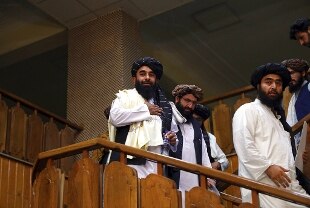Share
August 21, 2021 The fall of the pro-Western government and the return of the Taliban regime has entrusted the Islamists with the control of the official economy of Afghanistan, a task not entirely foreign to the movement, which in the course of twenty years of insurrection has put in place standing some sort of shadow administration in the areas of the country it controlled.
The Financial Times reconstructs the sources of financing for the Taliban, beyond the trafficking of opium and heroin, which represents a minority part of the movement's revenues.
The rebels have always earned more from tariffs on the transportation of goods such as fuel and cigarettes across their territories.
"The primary source" of Taliban finances "is the taxation of legal assets," David Mansfield, an Afghanistan analyst for the British think tank Overseas Development Institute, told Ft. "Drugs are not a significant source of funding for the Taliban as many claim, a belief that has led to a distorted understanding of the economy and rebellion."
After the US in recent days blocked access to central bank reserves and the IMF refused the release of a loan, the Taliban's control of border crossings and their central role in the shadow economy of the country will allow the movement to have some sort of buffer to cushion financial pressures. However, the new fundamentalist regime will have to move quickly to avoid the crisis and take over the payment of the salaries of public employees and the functioning of the state. The endemic corruption of the government of ousted President Ashraf Ghani has given the Taliban a chance to win the approval of many Afghans tired of having to pay bribes to corrupt officials.
But despite the reassurances, the Afghans ran to the bank to collect their savings in the hours after the militants took power and those who could tried to flee abroad. "These behaviors are already beginning to damage the economic position that the Taliban have built, explains Mansfield.
An example of Taliban economic governance is the stretch of road that connects the capital Kabul to the 78th mile border crossing in the southwestern province of Farah, at the Iranian border. The road has over 25 government checkpoints with tolls at various checkpoints. In contrast, the Taliban who control the same stretch of road have a single checkpoint and issue a receipt, so only one payment is required.
Ibraheem Bahiss, Afghanistan consultant for the International Crisis Group, says the Taliban presented themselves to the Afghans as the best administrators. "They have increasingly co-opted state infrastructure to offer better delivery services," Bahiss told Ft, explaining that in some areas Islamic militants have been concerned about getting teachers and nurses to go to work. In recent years, the Taliban have expanded their tax base with respect to the secular oshr, a tithe on crops, and zakat, a religious tax of 2.5% on incomes destined for the poor.
In Nimroz province, duties on goods in transit, such as vehicles and cigarettes, accounted for 80 percent of the Taliban's revenue, according to Odi. Illegal mining operations and taxes on imported fuels are additional sources of funding. According to consultancy Alcis, taxes on imported fuels from Iran earned the Taliban $ 30 million last year. Revenues from methamphetamine production have also grown in recent years, rivaling revenues from opium. The ephedra plant that grows wild in the highlands of central Afghanistan is used to make methamphetamines, according to the European Center for Drug and Addiction Monitoring.
Afghanistan remains the largest opium producer in the world despite the nine billion dollars spent on drug operations since the US invasion in 2001. Opium poppy cultivation has spread over the past twenty years, increasing by 37% last year alone. . The Taliban tax opium crops, but analysts disagree about their active participation in the trafficking.
Taliban spokesman Zabihullah Mujahid said the militants want to give up drugs and "revive the economy". "Afghanistan from today will be a country free from narcotics but it needs international aid. The international community must help us so that we can have alternative crops".
A former Taliban minister, who asked for anonymity, predicted "hard times" for the militants and the besieged country they are now seeking to govern. "The Afghan people will be in dire need of help, but it will not be easy to work with a Taliban bureaucracy for NGOs," he said. "The arrival of the Taliban has clearly embarrassed the United States, which instead of good relations may now seek political revenge."

